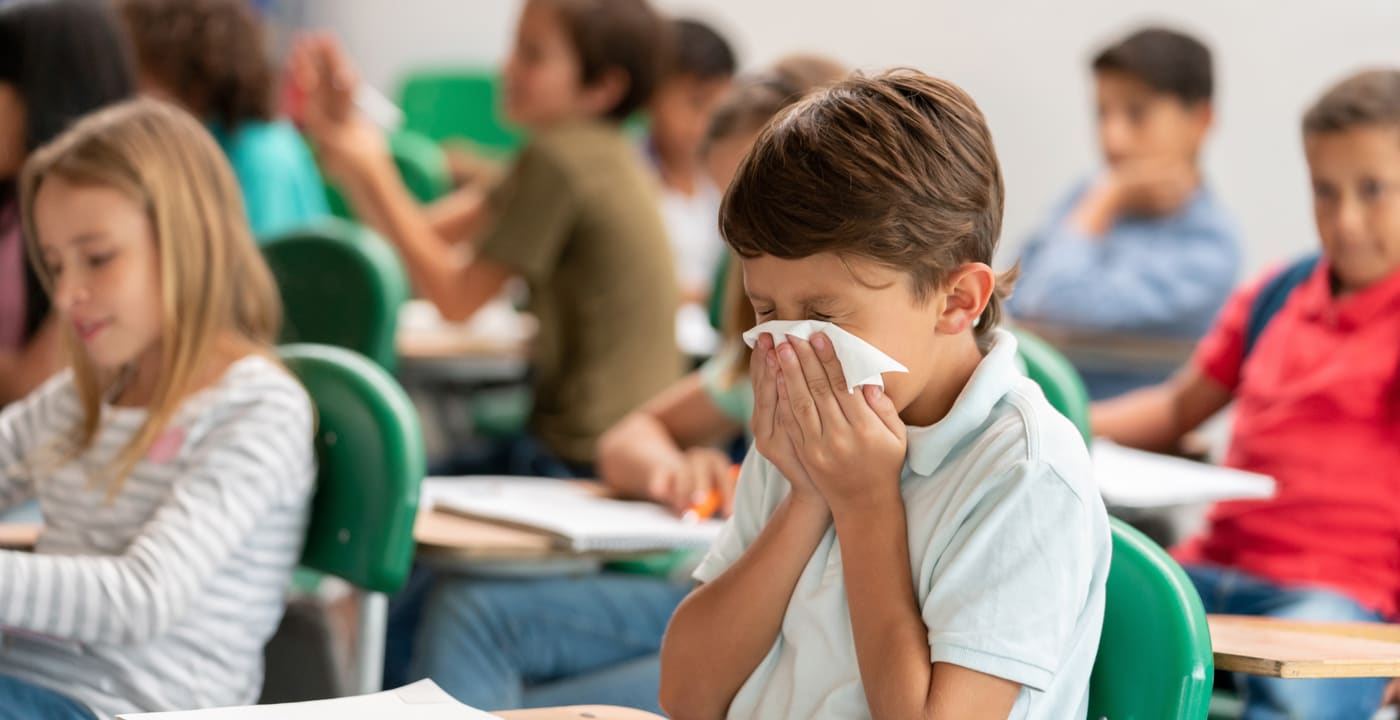Stomachaches & sniffles: It’s back-to-school season

At a glance
- Fevers, runny noses and stomachaches spike during beginning of school year
- Stress and anxiety can also cause head and stomachaches during the adjustment
- Proper hand hygiene and healthy habits, schedules are key to staying healthy
Kids are back in the classroom and parents know all too well what that means: The germs are back, too.
As students hit the books and gear up for fall sports — and the weather cools down — the risk for respiratory and gastrointestinal illnesses spikes, especially during the first few months of the school year, explains Sarah d’Hulst, MD, with MultiCare Rockwood Pediatrics.
“Kids are touching and all over each other all the time. … They can’t help it,” she says. “The job of kids is to play. They’re figuring out boundaries and learning how to interact with each other and in a group. It’s part of growing up.”
Unfortunately, all that interaction is the perfect opportunity for viruses to spread. But it’s not just a fever or runny nose that could keep them home, Dr. d’Hulst adds. Many kids also experience mental health challenges as their routine changes and stressors increase, resulting in headaches and stomachaches.
What to look out for
Most respiratory illnesses, including those that come in the form of a cold, fever or ear infection, are spread through droplets, Dr. d’Hulst says.
Think of the number of times you’ve seen a kid cough into their hand, then immediately touch a door handle or book. In a busy classroom, someone is bound to touch that same item, then touch their mouth or eyes moments later.
Proper hand hygiene should be taught during potty training, but a good scrub with water and soap isn’t always realistic throughout the school day, Dr. d’Hulst says. Keeping your student stocked with hand sanitizer can make a big difference. Remind them to sanitize before eating, when returning from the playground or between activities.
Don’t forget about lice
Lice can be an especially big problem among younger kids who spend a lot of time on the playground. Tea tree oil shampoo can help prevent it. If your child does get lice, keep them home and treat it immediately.
You can also teach kids to cough/sneeze into the inside of their elbow if a tissue isn’t handy, she says. Remember that it won’t be 100 percent effective among young kids climbing over one another on the playground.
If you suspect your child may be coming down with something, having them take zinc right away can help reduce the length and severity of the virus and get them back to school quicker, Dr. d’Hulst adds.
Kids with a controller inhaler for asthma should adhere to their prescribed dosages for at least two weeks prior to starting school, Dr. d’Hulst stresses. And not just if your child plans to play sports — asthma can worsen during our prolonged wildfire season, or if they catch a cold.
For gastrointestinal illnesses, teaching your child good hand hygiene and to stay away from those showing symptoms will be key. Gastroenteritis is easily contagious through contact with an infected person or lingering bacteria on a surface.
Keep water bottles to yourself!
Whether in the lunchroom or on the practice field, remind your kids to keep their Owala and Hydroflask water bottles to themselves to prevent the spread of viruses.
Pink eye, while more often a viral infection, is also extremely contagious among younger students who may not be great hand washers, Dr. d’Hulst says.
“Even in the bathroom, if all they’re willing to do is sanitize after, that’s something and we’ll take it,” she says. “But if we can see debris, we need soap and water.”
If you suspect pink eye, keep your child home until they’ve received treatment for at least 48 hours.
Mental health
All those hygiene habits are a lot to remember. Add to that a change in daily life, new sleep and eating schedules, hard classes, navigating friendships, feelings of anxiety and nerves, and, for older kids, the pressures of graduation, Dr. d’Hulst explains.
“There’s equally as much missed school for mental health as there is for a virus,” she says. “With little kids, there’s a lot of tears those first few days. It’s the same for the big kids, just in a different way.”
Your child may complain of consistent headaches or stomachaches the first few days or weeks of school, Dr. d’Hulst says. In most cases, they just need time to adjust to a new normal.
You can help by providing consistency where possible, like dinner together on weeknights or a relaxing after-school activity. While their feelings of sick are real, there’s likely no reason to usher them to the doctor, she says. Try over-the-counter relief and provide plenty of reassurance and a safe space to talk through those anxieties.
What's next
- Your roundup of back-to-school resources
- Notice your child squinting? Learn more about nearsightedness
- Find pediatric care for your child before they get sick




